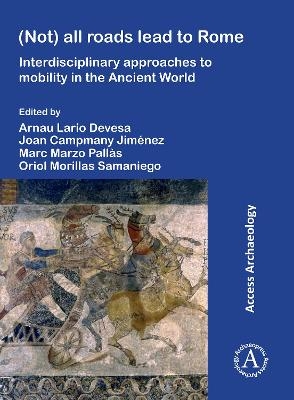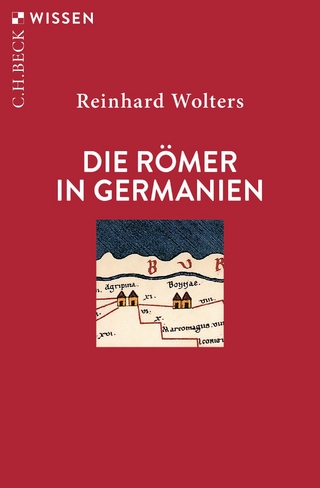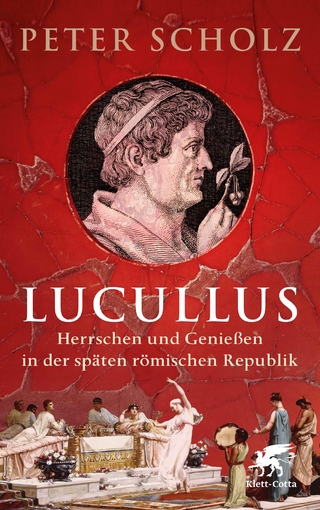
(Not) All Roads Lead to Rome
Archaeopress Access Archaeology (Verlag)
978-1-80327-517-8 (ISBN)
(Not) All Roads Lead to Rome is the result of the highly engaging debate within the “Annual Meeting of Postgraduates in Ancient History”, a yearly congress of young graduates and researchers held in April 2022 in the University of Barcelona. In this volume, the issue of mobility in Antiquity in its broadest sense is approached from a multidisciplinary perspective. One of the main objectives is, also, to give promising young scholars (postgraduates and PHD students) the opportunity to publish their early research on mobility and build a cohesive but thematically broad work. Although mobility is always present in studies of exchange and cultural diffusion, in this case it becomes the main subject of this collective research effort. We aim to encourage academic discussion around mobility as a key feature of societies, inherent to their functioning and where cultural, social and economic processes meet. The Mediterranean, and the Roman Empire by extension, is a dynamic area, and thus, it allows us to study mobility from many perspectives. In this volume, the movement of ideas, be they ideological or religious, is explored as it relates to underlying social and economic patterns. Likewise, the physical mobility of people across empires or within settlements is treated as a consequence of and a way to ease social relations. Social mobility too is discussed in the broader framework of socioeconomic dynamics, with case studies ranging from Egypt to Rome. Finally, the movement of goods (trade) is also part of this volume, as it was essential at bolstering interconnectivity in the Mediterranean. In that regard, archaeology holds the largest potential to provide new data regarding mobility of products, and thus long-distance contact and exchange.
Arnau Lario Devesa has a BA in Archaeology and another one in History, by the University of Barcelona, and a MA in Classical Archaeology in the University of La Sapienza-Università di Roma. He is currently a predoctoral researcher in the University of Barcelona. He is an active member of the “Centro para el Estudio de la Interdependencia Provincial en la Antigüedad Clásica” (CEIPAC). Joan Campmany Jiménez has a BA in Archaeology by the Autonomous University of Barcelona, specialising in Ancient History and Classical Archaeology. He has a MSt in Classical Archaeology from Oxford University, specialising in Landscape Archaeology and Archaeology of the Roman Economy. Currently, he is employed as a Research Assistant in the “Circular Economy and Urban Sustainability” Project, UrbNet, from Aarhus University. Marc Marzo Pallàs is an independent researcher and professional archaeologist (freelancer) that works in contract archaeology. His area of interest is the Archeology of Modern Warfare, particularly the Spanish Civil War (1936- 1939). Oriol Morillas Samaniego holds a BA in History (2020) at the University of Barcelona and a MA in Cultures and Languages of Antiquity. Member of the “Centro para el Estudio de la Interdependencia Provincial en la Antigüedad Clásica” (CEIPAC). Currently, he is a Assistant Researcher at the University of Barcelona, where he develops research on the study of Greek amphorae epigraphy from the Eastern Mediterranean.
Introduction – Arnau Lario Devesa, Joan Campmany Jiménez, Marc Marzo Pallàs, Oriol Morillas Samaniego ;
I. Migration and human mobility ;
Female mobility in diplomatic and military practice during the Roman expansion in the West (III-II c. BC) – Borja Vertedor Ballesteros, Hatin Boumehache Erjali ;
Understanding late antique mobility and “migrants” in modern thought – Teifion Gambold ;
II. Social mobility ;
Archaeological and spatial analysis of the Egyptian city of Lahun (Middle Kingdom, Fayum) – Laura Hernando Folch ;
The game of land: authority and adversary from a Ptolemaic land survey (P.HAUN. IV 70) – Chenqing An ;
Power and control: understanding prostitution in ancient times – Carina Mkrtchiyan ;
III. Moving identities and cultural/religious interactions ;
Mobility at the crossroads: careers and progression during the transition from Domitian to Trajan – Antonio Romano ;
Travelling mythologies: the movement of the divine throughout the Mediterranean and beyond – Zeren Deniz Ataçocuğu ;
The cult of Arsinoe II Philadelphus. The ‘international’ success of a Greek-Egyptian goddess – Anita Malagrinò Mustica ;
Fashioning a sense of belonging. Place in the commemorative epigrams of Gregory of Nazianzus & Ausonius of Bordeaux – Mathijs Clement ;
La dispersión del culto martirial de santos y santas locales por el territorio de Hispania entre los siglos IV-VI – Víctor Gómez Guinovart ;
IV. Political trends and practices ;
Whistles, applause and the welcoming of politicians by the Italic people: non-verbal expression of the crowd in the Late Ancient Republic – Agata Otranto ;
Rhetoric and mobility: an innovative vision of mobility in the post-Diocletian era – Antonio Avilio ;
Changes in late-antique Gaul: Gregory of Tours as an exceptional witness of social, economic and political mobility – Davide Vago ;
Episcopal correspondence in fifth-century Gaul. Leadership in times of crisis – Àngel Rodríguez García ;
V. Trade and movement of goods ;
The journey of a ceramic shape: trading black-figure amphorae to Iberia – Alejandro Garés-Molero, Guiomar Pulido-González, Garés-Molero and Pulido-González ;
Marmora and commerce: the case of the mortars in public spaces of Baetulo – Andrea Collado Padilla ;
Greek amphoric epigraphy and Mediterranean trade through the study of Rhodian amphora stamps in the CEIPAC database – Oriol Morillas Samaniego ;
Amphora typology and commercial mobility. Thoughts on the Tarraconensis case – Carlos Palacín Copado ;
The regulation of maritime transport in the Edict on Maximum Prices, a major cause of its failure – Antoni Nieva
| Erscheinungsdatum | 04.08.2023 |
|---|---|
| Sprache | englisch |
| Maße | 205 x 290 mm |
| Gewicht | 934 g |
| Themenwelt | Geisteswissenschaften ► Archäologie |
| Geschichte ► Allgemeine Geschichte ► Altertum / Antike | |
| ISBN-10 | 1-80327-517-0 / 1803275170 |
| ISBN-13 | 978-1-80327-517-8 / 9781803275178 |
| Zustand | Neuware |
| Informationen gemäß Produktsicherheitsverordnung (GPSR) | |
| Haben Sie eine Frage zum Produkt? |
aus dem Bereich


